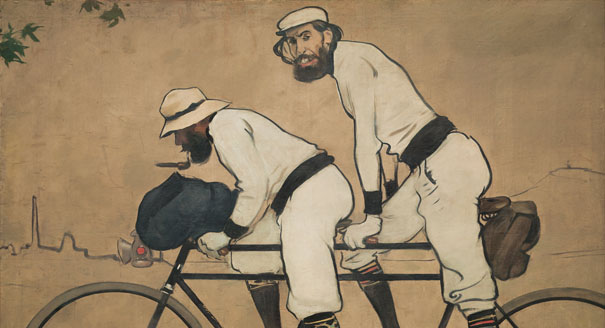The "tandem" is back—that was how Russians reacted when President Vladimir Putin's and Prime Minister Dmitry Medvedev's made a strange televised trip to the gym together at the end of the August.
Rumors of Medvedev's imminent political demise have circulated ever since Putin began his third presidential term in 2012, while his old friend became prime minister. But the man who both succeeded and preceded him as president is now being presented to us again as his close ally and even his successor.
The public workout was a classic special operation with messages both for the elite and the Russian general public. These messages suggest Russia has entered a different political reality from the one it has been living through for the past four years.
At the end of his presidential term in 2011, Medvedev surrendered his claim to be an independent politician and the well-known Putin-Medvedev "tandem" ended. A wave of conservatism and a backlash by the siloviki and new strongmen then destroyed practically the whole of Medvedev's legacy as president.
Many expected that Medvedev would not be able to bear this humiliation, that he would slam the door and maybe even become the head of a new opposition. But in April 2012 Medvedev suddenly disowned his own reputation. He declared that "he had never been a liberal in his convictions" and called himself "a person with conservative values."
This about-turn raised the question, "Who is Mr. Medvedev?" Putin's shadow? A cunning intriguer, who knows how to outwit his enemies through patience?
Over the past four years, we have actually encountered three different Medvedevs.
The Medvedev of 2011-2013 was a "political victim." Prime ministers in modern Russia are usually divided into the "political" (those of the Yeltsin period, as well as Mikhail Kasyanov) and the "technical" (Mikhail Fradkov, Viktor Zubkov). Medvedev fitted into neither category.
Medvedev was "technical" in that he was expected to forfeit the right of second-in-command in making decisions regarding policy and staff appointments to the presidential administration. He was also a political prime minister. He had after all been president of Russia for four years with all the accompanying electoral legitimacy, political mandate and direct involvement in world politics.
In September 2011, Medvedev's independence began to decline rapidly, as he was publicly lambasted for the performance of the government.
The Putin-Medvedev relationship—dry and somewhat cool—was based on the model of boss–employee. Putin criticized ministers in public, threatened to "take measures" and to take matters into his own hands. Reports of Putin's strong irritation with Medvedev's government were leaked to the media, which broadcast anti-Medvedev documentaries—"The Lost Day" (about the war in Georgia) and "Playing to Lose" (accusing Medvedev of pre-Western policies).
This phase in which Medvedev was cut down to size as a politician lasted almost two years. In the fall of 2013 speculation peaked about the likelihood of his resignation.
But in early 2014, as the Ukrainian crisis escalated and the economic situation in Russia worsened, a model of cooperation with Putin resumed. The president began defending the prime minister and cabinet and taking political responsibility for painful decisions they made.
In January 2014, Putin announced that he would meet with Medvedev every two weeks to discuss the development of the country. This sent a clear signal to the elite: From now on, keep your hands off the prime minister. Stability was more important. The country had entered a zone of turbulence, and no one was allowed to rock the boat. Medvedev was required to be a technical prime minister in the full sense.
And now, from August 2015, we again have Medvedev as a political prime minister. There were at least three signs of this before it was confirmed by the public work-out with Putin.
Firstly, Medvedev's protégés in government, such as Sergei Donskoy and Alexander Novak, have been unshackled and given more power.
Secondly, the heads of state-owned enterprises are stepping down: railways chief Vladimir Yakunin, whom Medvedev had twice attempted to fire without success, Evgeny Dod (RusHydro), and very likely Oleg Budargin (Rosseti).
Thirdly, it was announced that Medvedev will head United Russia's electoral list in the 2016 parliamentary elections. His political role is being mapped out for the future.
The joint trip to the gym was a public formalization of the new model. Putin is giving Medvedev back his political capital, which can then be used for a variety of purposes.
Why is Medvedev making a comeback ?
This is not all about Putin's cunning plans, as many people imagine. Times are changing and resources are diminishing. Strong political players with their ambitions and insatiable appetites are no longer so welcome. Men like Yakunin and Rosneft chief Igor Sechin have suffered defeats. This is a time for second-rank figures, for "technocrats."
Does this mean the return of the famous "tandem" under which Russia lived during the Medvedev presidency? We should not rush to conclusions.
Medvedev is being rehabilitated. He is useful to Putin as someone who has proven his willingness still to play ball, despite having suffered humiliation.
This is not enough for us to talk about a new tandem. It does however demonstrate Putin's need to delegate--not his authority, but responsibility for the direction of the country. It is important to understand that for Putin at the moment the question of who will be his a successor has become a technical issue. Everyone is in the same boat, threatened by the same storm. This is a time for everyone to work together and "toil like galley slaves."
Tatyana Stanovaya is the head of the analytical department at the Center for Political Technologies in Moscow.
